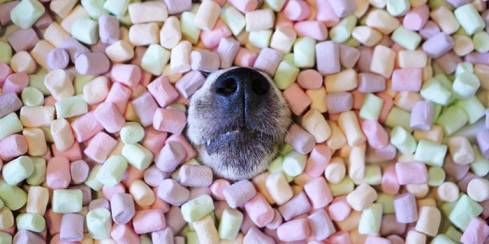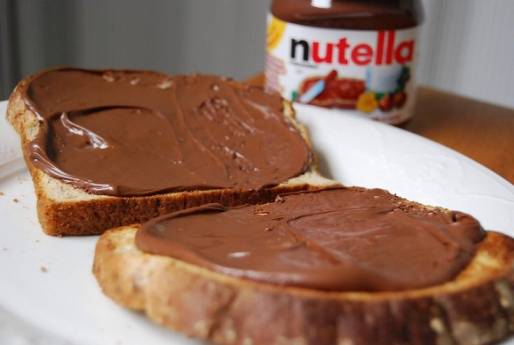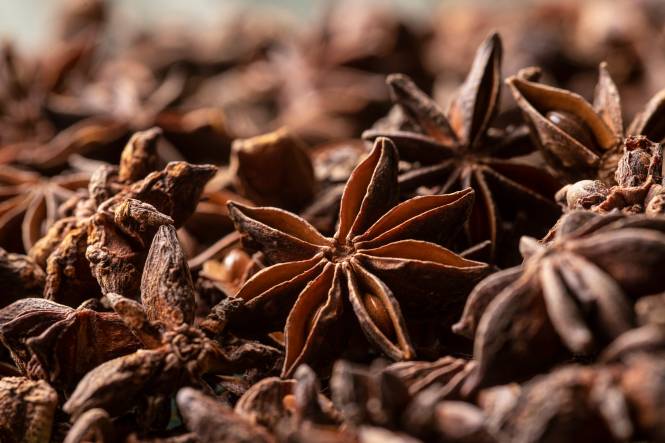Connect with a verified veterinarian in minutes. Licensed vets are available 24/7 to answer your questions. No need to worry about your furry family member.
Marshmallows, who doesn’t love them! These are wonderful fluffy, light bits of sweetness that are great in smores, hot chocolate, and more. But can dogs eat marshmallows?
The Ingredients of a Bag of Marshmallows: Why are Marshmallows Bad for Dogs?
There are many ingredients in a whole bag of marshmallows. Some are great for your dog, while others can be bad for your pet. You need to know what’s in a bag of marshmallows before you buy them.
First, you need to know that most bags of marshmallows contain artificial sweeteners. These artificial sweeteners have been linked to a number of health problems, including obesity and diabetes. This can lead to a host of other health problems, including heart disease and cancer.
Corn syrup and cornstarch are also common ingredients in most bags of marshmallows. Corn syrup is a source of high fructose corn syrup, which has been linked to many health problems, including diabetes and obesity.
Cornstarch is another sweetener used in marshmallows. It can be bad for your dog’s teeth and gut health. Also, it can lead to an increase in the number of digestive issues that your dog might have.
Peanuts are another ingredient that you’ll find in most bags of marshmallows. These are the most likely ingredient to cause problems for your dog. Peanut and peanut butter are poisonous for most dogs and can lead to a number of serious health problems including gastrointestinal issues, anemia, liver disease, pancreatitis and even death.
In addition, there are also artificial colors used in marshmallows as well as preservatives such as BHT (butylated hydroxyanisole), which is linked to cancer, allergies and other health problems in humans.
Even mini-marshmallows and sugar-free marshmallows can be bad for your dog. These marshmallows often contain aspartame, which is linked to a number of health problems, including cancer and brain damage. Gelatin is also used in many sugar-free marshmallows. Gelatin is a protein that is commonly used in the meat industry and it’s linked to many health problems, including cancer.
Marshmallows and Food Allergies
It’s possible that your dog may have a food allergy to marshmallows. Many dogs develop food allergies when they eat too much of one type of food, including marshmallows. The exact cause of this is unknown, but some believe that dogs develop allergies because they don’t get enough essential nutrients from the foods they eat.
The symptoms of a food allergy can be very similar to the symptoms of dog flu. They include sneezing, coughing, lethargy and vomiting. In addition, some dogs will even experience skin rashes or redness around their mouth or throat area.
Junk food and treats are known to cause many dog allergies. This is because junk food and treats have empty calories and often contain a lot of chemicals and preservatives that are bad for your dog’s health.
Food allergies can be serious and sometimes even life-threatening. In addition, they can lead to a host of other health problems, including skin rashes, digestive issues, hypoglycemia, gastrointestinal upset, and even ear infections.
If you think your dog may have a food allergy, talk to your vet about what you can do to help him or her avoid these foods. Also, be sure to consult with your vet about any possible changes in diet that might help your dog avoid these foods in the future. Instead, you can find many healthy dog snacks on Amazon, including these grain-free treats.

Review symptoms, medications & behavior to keep your pets healthy with a Vet Online in just minutes.
Ask a Vet Live NowDogs & Marshmallow—Not a Good Combination
The problem is that marshmallows are not very good for your pooch. That’s because, as mentioned, marshmallows either contain high amounts of sugar, or are sweetened with xylitol, which is toxic to dogs. In addition, they don’t contain any nutritional value for dogs.
The marshmallows made with xylitol are quite toxic for your doggie, even in small quantities. That’s because this sweetener can cause extremely low blood sugar, seizures and even death. It’s also toxic to the liver many days after the dog’s eaten this sweet treat.
Even marshmallows that contain sugar can lead to problems with weight gain, obesity, diabetes, and more. Eating too many marshmallows can also cause gastrointestinal issues in dogs such as diarrhea, vomiting, loss of appetite, and even pancreatitis. This is especially the case if the dog eats marshmallows on a regular basis.
What to Do When Your Dog Ate Marshmallows
If your dog ate marshmallows, the first thing you should do is try to determine what type of marshmallows your dog ate. The reason for this is that different types of marshmallows have different ingredients and different amounts of sugar.
For example, some marshmallows are made with gelatin and may not be safe for dogs. Gelatin can be dangerous for dogs because it can cause problems in their digestive system. Dogs who eat gelatin develop severe stomach upset, vomiting, diarrhea, and more. These symptoms can be serious and even life-threatening if left untreated.
You should also watch your dog closely after he or she eats marshmallows to make sure that he or she doesn’t have any problems like vomiting or diarrhea. In addition, you should check your dog’s poop for signs of illness such as blood in the stool or mucus in the stool. This could mean that your dog has an upset stomach from eating too many marshmallows. If this is the case, take him or her to the vet right away to make sure that everything is okay with him or her.
Sugary Treats for Dogs
Dogs are naturally attracted to sweet foods. In fact, it’s often hard to get them to eat dog food or kibble when they know that they’re going to get a treat. The reason for this is that treats make dogs feel good.
However, some treats can be dangerous for dogs because they can cause health problems if your dog eats too much of them. These include treats that contain nuts, chocolate, raisins, seeds, cheese, fruit, or even rawhide. The sugar in these treats can cause digestive problems and lead to obesity and other health issues. It’s best for your dog to avoid these types of treats when possible.
However, since dogs typically have a sweet tooth, it’s best to provide them with treats that have many health benefits for them. Treats like canned dog food, canned wet food, and treats made from fruits (like blueberries) and veggies are usually healthy for furry best friend.
There are also some dog treats that can be dangerous for dogs. These include things like jelly beans, gummy worms, fruit chews, and more. Dogs who eat these types of treats can develop problems in their digestive system or even cause problems in their mouth and teeth.
It’s best to keep your dog away from these types of treats when possible. In addition, you should talk to your vet about any changes in diet that might help your dog avoid these types of treats in the future.
Marshmallows are OK as a Rare Treat
It is OK to give your fur baby an occasional marshmallow treats (sweetened with sugar), once or twice in a great while. They can also be a great way to get your dog to eat or when he needs to take some medication. You can wrap the marshmallow around the medication, or let your dog know he’ll receive this yummy treat if he takes his medicine.
Otherwise, avoid giving your dog these sweet bits of fluff. They’re just not healthy. Instead, opt for healthier snacks such as cantaloupe chunks, watermelon (in moderation), a section of an orange, mangoes or apples.
On warm days, you might consider giving your fur baby frozen apple or orange slices. These can really cool your canine friend down when it’s hot!
Best Dog Treats Alternatives for Dog Lovers
Some dog breeds are known to be sensitive to certain types of foods. For example, bulldogs are known to have a sensitivity to dairy products, and the same goes for pugs. Some dogs also have a sensitivity to corn, wheat, or soy.
If you are feeding your dog treats and your dog has a food allergy, it’s important that you read the labels on the treats that you are giving him or her. Make sure that the treats you buy do not contain any of these ingredients.
Another alternative for those who love their dogs is making homemade dog treats. This is a great way to avoid your dog getting sick from eating junk food and treats that may cause him or her allergies. In addition, homemade dog treats can be healthier than store-bought treats because they won’t contain preservatives or chemicals that can harm your dog’s health in other ways.
Some people like to make healthy dog snacks out of fruits and vegetables like carrots and celery sticks because they contain many vitamins and minerals that are good for your dog’s health. In addition, fruits and vegetables are also low in calories so they won’t contribute much fat to your dog’s diet at all!
Dog owners should also keep in mind that some dog treats are toxic to dogs. These include chocolate, peanut butter, and even caffeine. The toxicity of these foods is a concern because they can cause your dog to have diarrhea or other health problems. Pet owners should be careful when giving their dogs treats that are high in caffeine or chocolate because these can cause a wide range of health problems.
Another treat that dogs love are apple and carrot treats. All you need is one cup of flour, one cup of carrots (grated), one egg and a half cup of apple sauce. Mix all ingredients together, form into patties and bake in a preheated at 350 F, for about 30-40 minutes.
How about some cranberry heart cookies for dogs? They’re also easy to make. You’ll need 2 eggs, 1 ½ cups of almond flour, 1 tablespoon of coconut oil, 3-4 tablespoons of coconut flour, and ½ cup of dried cranberries. Preheat the oven to 325 F, then beat the eggs and set aside. Next, combine the almond flour, coconut oil and dried cranberries. Then add in the eggs and knead the mix with your hands. Then add in the coconut flour to create a dough that’s easy to roll. It shouldn’t be too sticky. Then roll out the dough, cut it with cookie cutters, and bake on a parchment paper covered cookie sheet for 15-18 minutes. Remove from oven and allow to cool. Your fur baby will love these!
Healthy snacks keep your dog from gaining weight or developing diabetes and other health issues. Just avoid giving him marshmallows, except on very rare occasions.
Final Thoughts
Marshmallows are not the best option for your dog. Marshmallow treats are generally high in sugar and fat, which can lead to weight gain and health problems. If you do decide to give your dog a marshmallow treat, make sure it’s a small one. And, don’t give them too many at once.
The reason why marshmallows are not a good option for your dog is because they can cause digestive upset and other health problems. Dogs who have food allergies are especially prone to this, so if you suspect your dog has a food allergy, be sure to talk to your vet about this.
Instead, give your dog healthy treats that are made from real ingredients. These treats can include things like chicken, vegetables, fruit, or any other healthy treats that your dog will love. These treats are good for your dog’s health and can help to keep him or her happy and healthy.
Connect with a verified veterinarian in minutes. Licensed vets are available 24/7 to answer your questions. No need to worry about your furry family member.

Julie
Julie is a graduate of the University of North Carolina, Wilmington, where she studied Animal science. Though contrary to the opinion of her parents she was meant to study pharmacy, but she was in love with animals especially cats. Julie currently works in an animal research institute (NGO) in California and loves spending quality time with her little cat. She has the passion for making research about animals, how they survive, their way of life among others and publishes it. Julie is also happily married with two kids.
Review symptoms, medications & behavior to keep your pets healthy with a Vet Online in just minutes.
Ask a Vet Live Now





